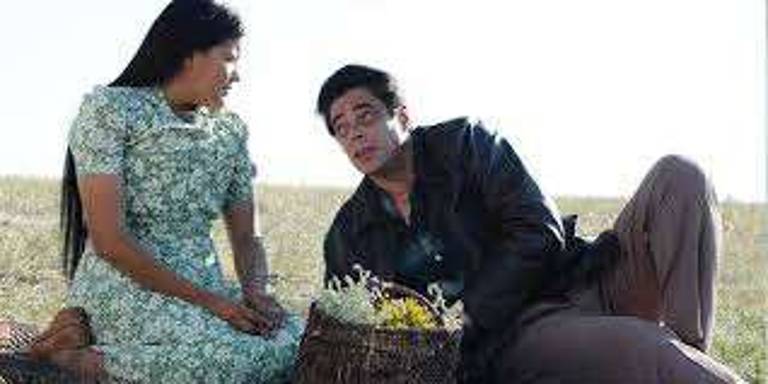DeTocqueville Goes West


In lieu of a style that coheres events and emotions in the life of WWII vet Jimmy, Desplechin mixes several different approaches, coming at Jimmy's biography from several angles: Flashbacks and metaphors combine with straight-forward scenes of Jimmy's debilitating headaches and occasional blindness. His confessions and dialogues with French-Hungarian Jewish anthropologist and therapist Georges Devereux (Mathieu Almaric), assigned to investigate and resolve Jimmy's psychosomatic ailments, further elaborates the main story into many.
Desplechin's aggravating method digresses rather than focuses, ruminates instead of defines. There's intellectual grandiosity to his forays (art, theater and film allusions) and yet a guileless dedication to what creates Jimmy's predicament: post-war experience as a veteran, a racial minority, a male perplexed by sex, ethnic tradition, and the need for love, family and community. All are shown alongside Devereux's own idiosyncrasies romancing married woman Madeleine (Gina McKee) and as a scientific outsider with identity issues.
But Jimmy P isn't as methodical as its title suggests. Desplechin's process develops from the style of French New Wave films like Truffaut's The Wild Child and Alain Jessua's Life Upside Down, humanistic essays about the vagaries of personality and socialization. Desplechin replaces the poetic brevity of those films with vain absorption in his own process which always extenuates his storytelling. Jimmy P's tangents create a narrative puzzle that contradicts the banality of psychotherapeutic problem-solving. Not the French tradition-of-quality like his overrated A Christmas Tale or the glib nihilism of his also overrated Kings and Queen yet that's essentially what happens.
Treating Jimmy as a case-study is no better than the obvious do-gooder intentions of race-problem pics Pressure Point, Home of the Brave, Cry Freedom, Let There Be Light or even Michael Cimino's Thunderheart. Desplechin's narrative affectation gives the superficial appearance of innovation. It's for filmgoers who like to muse and loiter rather than think or feel. The duets between Del Toro and Almaric let two good actors harmonize in different styles (intense introspection, manic exuberance) which becomes an additional narrative embellishment.
Del Toro and Almaric converse as if translating their humanity through linguistic, cultural and class barriers. Jimmy speaks as an eternal alien from the reservation while Devereux plays both Tocqueville and Jean-Jacques Rousseau's descendant: "I didn't help Jimmy because he was an Indian but because it was in my power to help him. It was between two men of good will looking for common ground. Sure we are different, all men rejoice differently, but still we should all sit down to Gods banquet."
Jimmy P is a mess of good intentions, artistic pretense (Malick-style vistas of the American west inhabited by ostracized Natives) and compelling acting (DelToro's marvelous concentration, Misty Upham's graceful benevolence as Jimmy's wronged true love). The film's confused liberalism downplays the sanctimony that poisons recent movies about America's race history. Yet Desplechin's method isn't as strong as cinema's best accomplishments of compassion and brotherhood--whether the modern colonial consciousness of Renoir's The River or its New World development in Altman's Kansas City.
Desplechin's penchant for questioning scientific routine as merely an attempt to understand and control mankind's mysteries ("Sometimes we have scars on the body, sometimes there are scars on the mind, too") dodges experiences that Americans know first hand. Madeleine's smiling summation "You put the soul in the heart, the heart in the mind, and the mind in the body and the body in the person, voila!" exposes Depleschin's pseudo-scientific lack of craftsmanship. And yet, this may be his best film.
Follow Armond White on Twitter at 3xchair